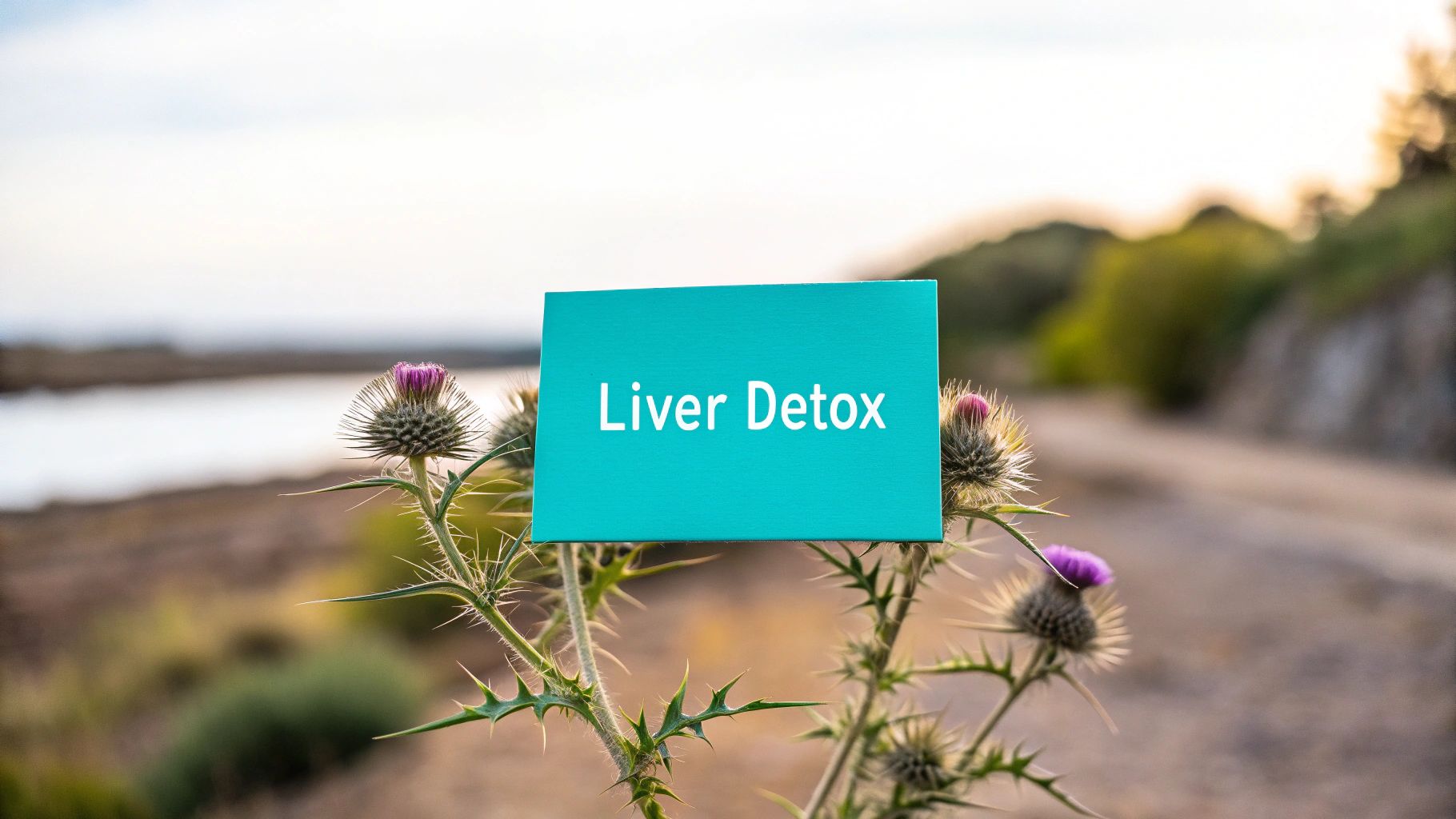

· By Annemarie
Milk Thistle for Liver Detox: Boost Your Liver Health
The Ancient Wisdom of Milk Thistle for Liver Detox

Milk thistle, with its vibrant purple flowers, might appear unassuming. However, its history of supporting liver health is long and rich. For over 2000 years, this botanical remedy has been recognized for its potential to aid in liver detoxification, creating a fascinating bridge between ancient practices and modern science. Let’s explore how milk thistle evolved from a traditional folk remedy into a widely used supplement.
A Legacy of Liver Support
The use of milk thistle for liver detoxification dates back to ancient Greece and Rome. These civilizations understood the plant's power long before the advent of modern scientific methods. The Greek physician Dioscorides, for instance, documented milk thistle’s use in his 1st-century AD work, De Materia Medica. He noted its effectiveness in expelling bile and treating snake bites.
The Roman naturalist Pliny the Elder also praised milk thistle for its ability to address liver and gallbladder issues. This extensive history reinforces its long-standing reputation as a powerful liver tonic. Learn more about the history of milk thistle.
Cultural Uses and Traditions
Milk thistle’s presence in diverse healing practices highlights its global significance. Traditional healers across various cultures incorporated this potent herb into their remedies, often blending it with other beneficial plants. This accumulated knowledge, passed down through generations, demonstrates a deep-seated belief in milk thistle’s liver-supporting properties. Furthermore, these traditional applications have served as a catalyst for modern scientific research into its effectiveness.
From Folk Remedy to Modern Supplement
Modern research continues to explore the connection between gut health and overall well-being, echoing observations made in alternative therapies. For example, some studies are investigating the link between CBD oil and gut health. This expanding body of research further emphasizes the interconnectedness of our body’s complex systems.
Today, milk thistle holds the attention of both traditional herbalists and modern scientists. Its unique attributes have propelled its widespread availability as a supplement, offering a natural path towards liver support. This transition from a folk remedy to a readily available supplement demonstrates the enduring strength and adaptability of this ancient plant. Milk thistle's continued relevance in the natural health world showcases its remarkable ability to remain relevant amid evolving scientific understanding.
Silymarin Unveiled: The Science Behind Milk Thistle's Power

Milk thistle has a long-standing reputation as a beneficial herb for liver support. This isn't just folklore; the plant's power comes from silymarin, a unique flavonoid complex. Silymarin is responsible for milk thistle's remarkable effects on liver health. This section explores the science behind silymarin and how it works to protect and revitalize the liver. Understanding this mechanism helps highlight the potential of milk thistle for liver detox.
Understanding Silymarin's Protective Role
Silymarin acts as a protective shield for liver cells, guarding them against damage from toxins. This protective effect is essential for maintaining optimal liver function. Imagine silymarin as a gatekeeper, preventing harmful substances from entering your liver cells. This helps maintain the liver's overall integrity and functionality.
Silymarin also functions as a potent antioxidant. It neutralizes harmful free radicals that can cause oxidative stress. This antioxidant activity further strengthens the liver's defense against damage. Like a cleanup crew, silymarin scavenges these destructive molecules, preventing them from harming liver cells. This combined action of protection and cleanup is central to silymarin's liver-supporting properties.
Milk thistle typically contains about 4-6% silymarin. This flavonoid complex is well-known for its antioxidant and anti-inflammatory properties, which significantly contribute to its ability to protect liver cells from toxins. Its widespread use in supplements reflects its popularity for those looking to improve their liver health. Find more detailed statistics here. You might also be interested in: How to master...
To better understand the composition of silymarin, let's take a closer look at its key components and their individual benefits.
The following table outlines the key flavonoids within silymarin and their specific benefits for liver health.
| Flavonoid | Percentage in Silymarin | Primary Benefit |
|---|---|---|
| Silybin A | Antioxidant, anti-inflammatory | |
| Silybin B | Antioxidant, anti-inflammatory | |
| Isosilybin A | Antioxidant, anti-inflammatory | |
| Isosilybin B | Antioxidant, anti-inflammatory | |
| Silychristin | Antioxidant | |
| Silydianin | Antioxidant |
As this table demonstrates, the various components of silymarin work together to provide comprehensive liver support.
Cellular Regeneration and Liver Health
Beyond its protective role, silymarin also promotes cellular regeneration. It does this by stimulating protein synthesis within the liver. This process helps repair damaged liver tissue and supports the growth of new, healthy cells. This regenerative capability is an important aspect of liver detox, facilitating the renewal and revitalization of this essential organ. Silymarin acts like a construction crew, providing the necessary building blocks for liver cell repair and growth.
Synergy for Detoxification
Silymarin's multiple mechanisms work together synergistically to enhance the liver's natural detoxification processes. By protecting liver cells, neutralizing free radicals, and promoting regeneration, silymarin empowers the liver to process and eliminate toxins more efficiently. This combined approach leads to a more effective and comprehensive liver detox. This multi-pronged action enhances the liver's natural resilience, allowing it to better handle the constant influx of environmental toxins, alcohol, and metabolic byproducts. This is a key factor that differentiates milk thistle from other liver-supporting herbs.
The Evidence Behind Milk Thistle for Liver Detox

Milk thistle has drawn considerable interest for its potential to support liver health. But how much of the buzz is backed by actual science? This section explores the research surrounding milk thistle, separating fact from fiction. We'll delve into what studies reveal about its impact on various liver conditions.
Examining The Clinical Studies
Many studies have examined milk thistle's effect on liver health, looking at conditions ranging from alcohol-related liver disease to non-alcoholic fatty liver disease (NAFLD) and hepatitis. These studies differ in their design, the number of participants, and the results they find, so a careful look at the evidence is key.
Some research points to potential benefits like improved liver function markers and less inflammation. However, other studies haven't been as conclusive. This suggests more robust research is needed. While the findings are promising, the current evidence isn't completely consistent.
In terms of clinical impact, studies have looked at milk thistle's effect on liver disease. Some findings suggest it might improve liver function markers under certain conditions. For example, a systematic review supported by the National Center for Complementary and Integrative Health (NCCIH) (formerly known as the National Center for Complementary and Alternative Medicine) looked at how milk thistle affects different liver diseases. These included alcohol-related liver disease, toxin-induced liver damage, and viral hepatitis.
While the results were mixed, the review highlights the potential of milk thistle to improve the quality of life for people with liver disease and potentially reduce morbidity. However, more research is still needed to fully understand how effective it really is. Historically, milk thistle has been used for liver and gallbladder disorders. Dioscorides, as early as the 1st century AD, noted its potential for treating snake bites and countering other toxins.
Understanding The Limitations and Contradictions
Scientific research, like life, can be complex. Often, studies present contradictory findings, and milk thistle research is no exception. Differences in how studies are designed, who participates, and the specific kind of milk thistle extract used can all affect the results.
It’s also difficult to isolate the effects of a single herb within the complexity of the human body. This makes it crucial to look at all the evidence together, not just single studies. Understanding these limitations helps future research target these gaps and give us clearer answers.
The following table summarizes some research findings related to the use of Milk Thistle for different liver conditions:
Research Findings on Milk Thistle for Different Liver Conditions
| Liver Condition | Level of Evidence | Observed Benefits | Research Limitations |
|---|---|---|---|
| Alcohol-related liver disease | Moderate | May improve liver function tests in some patients | Inconsistent findings across studies, varying dosages and durations used |
| Non-alcoholic fatty liver disease (NAFLD) | Moderate | May reduce liver inflammation and improve some liver enzyme levels | More large-scale, long-term studies are needed to confirm benefits |
| Viral hepatitis | Limited | Some evidence suggests potential benefits, but more research is needed | Studies are often small and have methodological limitations |
| Toxin-induced liver damage | Limited | May offer some protection against liver damage from certain toxins | Further research is needed to determine specific benefits and optimal usage |
The table above highlights the varying levels of evidence for milk thistle's benefits across different liver conditions. While some promising results have been observed, particularly in alcohol-related liver disease and NAFLD, more rigorous research is needed to solidify these findings and address existing research limitations.
The Potential of Milk Thistle: A Balanced Perspective
The current research offers a mixed picture of how well milk thistle works. However, there's enough evidence to justify more research into its potential benefits. Some studies indicate that milk thistle might support liver function, especially in individuals with specific liver conditions.
However, more large-scale clinical trials with rigorous designs are needed to confirm these initial findings and provide clear guidance on how to use it. A balanced perspective—acknowledging both the potential upsides and the need for more research—allows for informed decisions. This empowers people to decide about using milk thistle based on a realistic understanding of the available evidence. As always, talking to a healthcare professional is essential to determine if milk thistle is a good choice for your individual situation.
Maximizing Milk Thistle: Practical Detox Strategies That Work

Understanding the science behind milk thistle is important. Putting that knowledge into actual practice is key for liver detoxification. This section offers practical, evidence-based strategies for using milk thistle supplements effectively. We'll cover dosage, different forms of milk thistle, timing, and combining it with other beneficial nutrients.
Optimal Dosage and Different Forms of Milk Thistle
Finding the right milk thistle dosage for liver detox depends on several factors. These include individual health and the specific product. Most studies use a standardized extract with 70-80% silymarin, the active compound in milk thistle. A typical daily dose in these studies is between 420-600mg of silymarin, split into two or three doses.
Milk thistle comes in various forms, each with its own absorption profile:
- Standardized Extracts: These provide a consistent amount of silymarin, making dosage simple. They are readily available and frequently used in research.
- Tinctures: These liquid extracts may be absorbed more easily by some. They are traditionally taken by dropping the tincture directly into the mouth or into a drink.
- Whole Herb Preparations: Capsules filled with powdered milk thistle seeds are also an option. The silymarin content may be less consistent.
This variety lets you choose the form that best suits your needs. However, talking to a healthcare provider or registered dietitian is recommended for personalized advice. For instance, those with underlying health conditions might need adjusted dosages.
Timing and Synergistic Combinations
When you take milk thistle can also affect how well it works. Taking it with meals, especially those with healthy fats, may improve silymarin absorption. Some medications can interact with milk thistle, so discuss timing with a doctor or pharmacist.
You can boost milk thistle's detoxifying effects by combining it with other herbs and nutrients. Herbs like dandelion root and artichoke leaf also support liver function. Antioxidants like vitamin C and vitamin E can help protect liver cells.
Choosing Quality Products and Avoiding Marketing Traps
Navigating the supplement market can be tricky. Choosing high-quality milk thistle products is vital. Look for products that have been third-party tested for purity and potency. This independent testing confirms the contents and checks for contaminants.
Beware of marketing claims that promise fast results. Liver detox is complex, and no single supplement offers instant solutions. Stick to reputable brands that value transparency and science.
Integrating Milk Thistle into a Liver Support Protocol
Milk thistle can be a helpful part of a broader liver support plan. This approach includes lifestyle changes, dietary adjustments, and other supportive measures. For example, limiting alcohol, eating a balanced diet with plenty of fruits and vegetables, and managing stress can significantly benefit liver health.
Staying hydrated by drinking enough water supports the liver's natural detox processes. Regular exercise also plays a vital role in overall health and can indirectly benefit the liver. Combining milk thistle with these lifestyle changes creates a synergistic approach to liver support. Remember that milk thistle isn't a replacement for a healthy lifestyle. It works best as part of a comprehensive wellness strategy.
Beyond The Hype: Safety Profiles and Potential Concerns
This section takes an honest look at the safety of using milk thistle for liver detox. While generally regarded as safe, milk thistle isn't for everyone. We'll explore who should exercise caution and discuss potential side effects and interactions.
Who Should Exercise Caution With Milk Thistle?
Milk thistle is typically well-tolerated. However, certain individuals should approach its use cautiously.
Those with hormone-sensitive conditions like breast, uterine, or ovarian cancer, endometriosis, or uterine fibroids should consult their doctor before using milk thistle. This is because silymarin, a key component of milk thistle, can exhibit estrogenic effects.
People with diabetes should also exercise caution. Milk thistle may lower blood sugar levels, creating a potential interaction with diabetes medications.
If you have allergies to plants in the Asteraceae/Compositae family (ragweed, chrysanthemums, marigolds, daisies), you might also be allergic to milk thistle.
Finally, because milk thistle can interact with certain medications, always discuss its use with your doctor, particularly if you are taking prescription drugs.
Potential Side Effects and Interactions
Milk thistle can sometimes cause mild side effects, such as an upset stomach, diarrhea, or headaches. These are usually temporary and resolve on their own. However, if you experience more severe or persistent symptoms, discontinue use and consult your doctor. You might be interested in checking out additional product information.
Milk thistle can interact with several medications. It can affect the cytochrome P450 enzyme system, which the liver uses to process many drugs. This can alter how your body metabolizes these medications. For example, milk thistle might enhance the effects of some medications by slowing their breakdown. Conversely, it could reduce the effectiveness of others by accelerating their metabolism.
Minimizing Risks and Maximizing Benefits
To minimize potential risks and maximize the benefits of milk thistle:
- Start with a low dose and gradually increase it as tolerated.
- Choose high-quality supplements from reputable brands. Look for standardized extracts containing 70-80% silymarin.
- Take milk thistle with meals to improve absorption.
- Inform your doctor about all supplements and medications you're currently taking.
By understanding the potential concerns and taking appropriate precautions, you can safely harness the benefits of milk thistle for liver support while minimizing any potential risks. This proactive approach promotes safe and effective use. Always consult with your healthcare provider for personalized guidance. They can help you safely and effectively integrate milk thistle into your health regimen.
The Broader Benefits: Milk Thistle Beyond Liver Support
While milk thistle is best known for its liver-detoxifying properties, research suggests it offers a range of other potential benefits. This article explores promising studies on milk thistle's impact on blood sugar regulation, cognitive function, skin health, and metabolic function. We'll examine how silymarin, the active compound in milk thistle, and its antioxidant and anti-inflammatory properties could positively influence various body systems.
Milk Thistle and Blood Sugar Regulation
Emerging research suggests milk thistle might help manage blood sugar levels. Silymarin may improve insulin sensitivity, meaning your body uses insulin more effectively. This could be particularly helpful for individuals with type 2 diabetes or those at risk. More research is needed to fully understand milk thistle's impact on blood sugar control and its practical application.
Cognitive Protection and Milk Thistle
Some studies indicate that milk thistle's antioxidant properties could protect brain cells from oxidative stress. This type of stress is linked to cognitive decline and neurodegenerative diseases. While the findings are preliminary, they suggest milk thistle might support cognitive health. Further research is essential to investigate this potential benefit.
Skin Health and the Potential of Milk Thistle
Milk thistle's antioxidant and anti-inflammatory properties might also benefit skin health. Silymarin could protect skin cells from damage caused by UV radiation and other environmental stressors. It may also help reduce skin inflammation associated with conditions like acne and eczema. This presents exciting possibilities for using milk thistle in skincare.
Metabolic Function and Milk Thistle
Some evidence suggests milk thistle could support overall metabolic function. Its positive effects on liver health, blood sugar regulation, and inflammation could indirectly contribute to a healthier metabolism. This makes it a potential addition to weight management strategies. However, more research is needed to confirm these metabolic benefits.
Practical Considerations for Milk Thistle Supplementation
It’s important to have realistic expectations about these potential benefits. While milk thistle shows promise, more research is needed to solidify these findings. Learn more in our article about sitemaps.
If you’re considering milk thistle supplements for anything beyond liver detox, consult your doctor or a qualified healthcare professional. They can help determine if it’s appropriate for your individual needs and health status. They can also advise you on appropriate dosages and potential interactions with other medications. This is especially important if you have pre-existing health conditions or are pregnant or breastfeeding. A balanced approach, informed by both research and professional guidance, is essential for harnessing the potential of this herb.
Feeling sluggish and tired of hangovers? Upside Hangover Sticks offer a convenient and effective way to counteract common hangover symptoms so you can live life to the fullest. Made with proven natural ingredients inspired by traditional Korean medicine, Upside is your go-to solution for a hangover-free morning. Try Upside Hangover Sticks today and reclaim your mornings!
